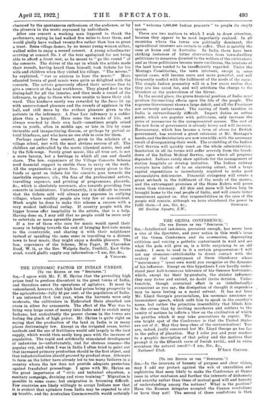THE ECONOMIC FACTOR IN INDIAN UNREST. (To THE EDITOR or
THE " SPECTATOR.") Sfa,—I agree with Mr. P. H. Shrine that the prevailing high prices tend to produce discontent in the great towns of India, and therefore assist the operations of agitators. It must be rethembered, however, that high food prices bring prosperity to the agriculturists—fully S2 per cent. of the population of India. I am informed that last year, when the harvests were only moderate, the cultivators in Hyderabad State absorbed one crore in silver for ornaments. The effect of the War was to bring very largo sums of money into India and to enrich many Indians; but undoubtedly the poorer classes in the towns are feeling the pinch of high prices. Mr. Shrine is quite right on saying that the production of the land in India is in many places distressingly low. Except in the irrigated areas, better methods and the use of fertilizers would add largely to the food supply, which would then easily keep pace with the increase of population. The rapid and artificially stimulated development of industries is—unfortunately, and for obvious reasons—the popular cry, and when I was in India I often tried to point out that increased primary production should be the first object, and that industrialization should proceed by gradual steps. Attempts to force on the latter have already led to too many failures in a country where the law does not provide adequate protection against fraudulent proceedings. I agree with Mr. Skrino on the great importance of " civic and technical education, a sfinitaiy campaign, draining and river training." Migration is possible in some cases; but emigration is becoming difficult. Few countries are likely willingly to accept Indians now that it is evident that agitators from India may be expected to stir AD trouble. and the Australian Commonwealth would certainly not "welcome 5,000,000 Indian peasants" to people its empty spaces.
There are two matters to which I wish to draw attention. because they appear to be most imperfectly realized. In all countries where the towns are politically dominant, the agricultural interests are certain to suffer. That is notably the case at home and in Australia. In India there have been striking instances of bitter obstruction from town-dwelling politicians to measures directed to the welfare of the cultivators, and as these politicians become more vociferous, the interests of the land have tended to be insufficiently regarded. Under the Montagu Constitution, the town interests, except in some special cases, will become more and more powerful, and will frequently conflict with the fulfilment of the needs of the royal. The simple Indian peasantry will in a few years realize that they are less cared for, and will attribute the change to the blunders or the malevolence of the Sircar.
In the second place, the grave financial position of India must produce far-reaching effects upon the life of the people. The supreme Government shows a large deficit, and all the Provinces are seriously embarrassed. The raising of fresh taxation in India is extraordinarily difficult. Import duties on cotton goods, which are popular with politicians, only increase the price of necessaries to the unrepresented masses. The cost of the new form of government is already heavy and will increase. Bureaucracy, which has become a term of abuse for British government, has received a great extension at Mr. Montagu's hands, and the Secretariats are now unwieldy, with tho necessary result of disorganizing their work. The crumbling of the Indian Civil Service will quickly react on the whole administration. Sanitation in all its forms will suffer severely from the break- down of the Indian Medical Service, upon which all progress depended. Indians rarely show aptitude for the management of station hospitals or develop initiative. The Indian railway receipts have fallen off to an alarming extent, and a large capital expenditure is immediately required to make good accumulative deficiencies. Financial stringency will create a great set-back in the fulfilment of the needs of the masses, and the extravagant promises of the Home Rulers will prove worse than visionary. All this and more will before long be brought home to the real people of India, and will create bitter resentment against us. Our responsibilities in the eyes of the people will remain, although we have abandoned the power to


































 Previous page
Previous page